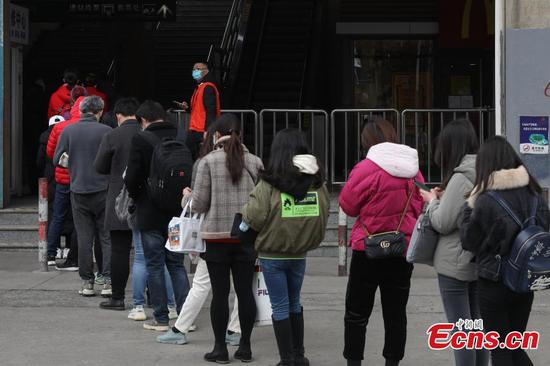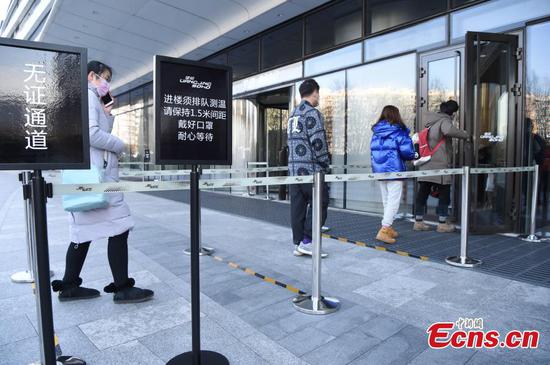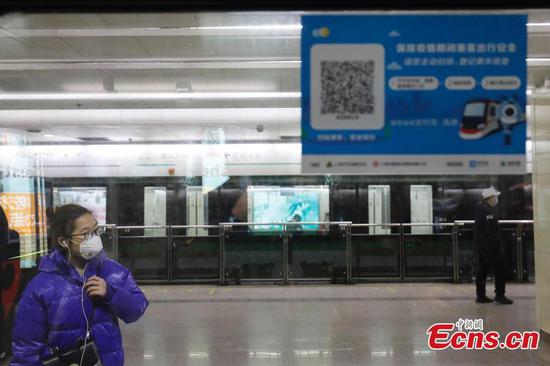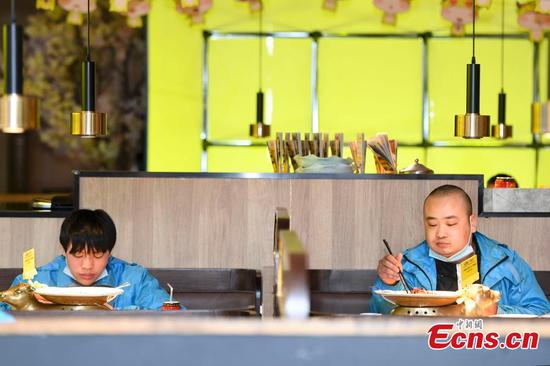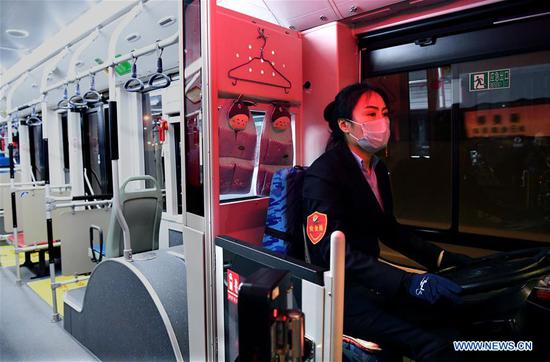
A courier delivers food for online service company Ele.me and Koubei in Nanning, capital of South China's Guangxi Zhuang autonomous region, on Feb 6. (Photo/China News Service)
Ele.me and Koubei, Alibaba's local services company, has launched a job-sharing platform to encourage those who have been working at restaurants to explore alternative work opportunities in jobs like that of deliverymen in the wake of the novel coronavirus outbreak.
The pressure of rising rent and labor costs had led to temporary closure of many restaurants affected by the epidemic.
The catering industry has been hit hard as a big part of the population is confined indoors due to restrictions placed on large gatherings at public places like restaurants, in order to contain the spread of the virus.
Restaurant workers on short-term wages have been struggling to make both ends meet due to epidemic-related loss of income.
Alibaba's company aims to hire 10,000 deliverymen through the platform. Merchants listed on Ele.me and Koubei can recommend the job opportunities to their employees, who can arrange their time flexibly to receive orders and deliver the food for their own stores.
The company will check the health condition of each deliveryman, give him masks, offer lessons about protective measures as well as record their body temperature before each delivery.
So far, about 4,000 restaurant workers have expressed willingness to take up temporary jobs of deliverymen, according to Ele.me and Koubei.
The economy-boosting online-to-offline or O2O business model has not only focused on food delivery but expanded the business scope to span supermarkets, fresh fruits and vegetables, flowers and medicines, to lure consumers.
Supermarkets, convenience stores and fresh food stores have vowed to ensure adequate supplies of daily necessities without raising prices during the novel coronavirus outbreak. But they are facing staff shortage in jobs like sorting and handling, as the demand for essential commodities like vegetables, meat, rice, flour, cooking oil and meat is surging. Restaurant owners are also encouraged to let their employees work in neighborhood supermarkets.
Alibaba's company has also decided to waive commission fees for merchants on its lifestyle services platform Koubei. It will step up efforts to offer loans to merchants facing cash crunch.
The commission fees were suspended for merchants until Feb 29, while merchants in Wuhan, the capital of Central China's Hubei province and the epicenter of the outbreak, will have their fees exempted until March 31.
Apart from deliveryman, the booming on-demand food delivery industry has created a string of new jobs, such as food delivery planner, craftsman host and operations analyst.
Zhu Xiaopeng, who was born in the 1990s in Hangzhou, Zhejiang province, now works as a food delivery planner. He established a food delivery operations company to provide solutions that can help merchants better manage with their online businesses.
"Our operations-focused colleagues can see the overall sales volume of the merchants on the platform after setting an appropriate price and implement some promotional activities, such as discounts, coupons and perks," Zhu said.
In a little over two years, his team has helped over 6,000 merchants increase their revenues by up to 40 percent.
"We would spend more than two hours tasting different types of takeout food. I once ate over 40 kinds of food and then went to the gym to lose weight together with my colleagues," Zhu said, laughing.
The company also has a small studio to take photos of food samples for merchants. "The appearance of food will impress consumers more than the taste. Many pictures taken by merchants themselves are not aesthetic, so we will help them solve the problem, making the photos of sample food more attractive," he said.
An employee who joined the team for three months earned 30,000 yuan ($4,300) each month, he said.
Oby, a hair-stylist in Guangzhou, commands a clientele of more than 400 clients each month, earning around 400,000 yuan in revenue for the hair salon. She said most of her customers make advance reservation through phone calls, text messages and the Koubei platform.
In her view, hair-styling is an art or a craft that calls for high levels of craftsmanship. During the Nov 11 shopping carnival, Oby shared her daily work details and some ideas about hairstyle design with netizens during a live-streaming session.
When searching for local life services online, many users tend to key in "craftsman" instead of "store". This habit has put hairdressers, manicurists and pet cosmetologists in the top three slots in the list of occupations searched for, according to a report by Ele.me and Koubei.
Mei Xinyu, a researcher at the Chinese Academy of International Trade and Economic Cooperation, which is under the Ministry of Commerce, said the innovative mode of "craftsman plus internet" fundamentally broadens the business boundaries between merchants and craftsmen, and enables many traditional industries to reframe their role in society.















